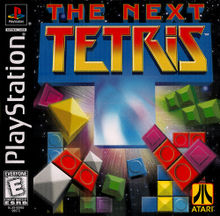The Next Tetris: Difference between revisions
No edit summary |
No edit summary |
||
| Line 15: | Line 15: | ||
}} | }} | ||
'''''The Next Tetris''''' is a game for PlayStation and PC. It was subsequently re-released as ''The Next Tetris DLX'' for PlayStation and ''The Next Tetris: On-line Edition'' for Dreamcast, and ported to Toshiba Nuon DVD players. It distinguished itself with its gimmick of [[multiminos]], pieces that consist of different coloured blocks that would separate when landing. | '''''The Next Tetris''''' is a game for PlayStation and PC. It was subsequently re-released as ''The Next Tetris DLX'' for PlayStation and ''The Next Tetris: On-line Edition'' for Dreamcast, and ported to Toshiba Nuon DVD players. It distinguished itself with its gimmick of [[tetromino#Multimino|multiminos]], pieces that consist of different coloured blocks that would separate when landing. | ||
== The Next Tetris == | == The Next Tetris == | ||
The main mode of the game, this features both regular [[ | The main mode of the game, this features both regular [[tetromino]]es and multiminos, which are multi-colored and break into smaller pieces of separate colors when they lock. Blocks of the same color glue themselves together. Anything with nothing supporting it falls, potentially leading to a [[cascade]]. | ||
=== One Player Mode === | === One Player Mode === | ||
Revision as of 12:12, 18 August 2019
| The Next Tetris | |
|---|---|
 | |
| Developer(s) | AnimaTek Intl. Blue Planet Software |
| Publisher(s) | Hasbro Interactive (PlayStation, Windows, Nuon) Crave Entertainment (Dreamcast) |
| Platform(s) | PlayStation, Windows, Dreamcast, Nuon |
| Release | PlayStation
|
| Gameplay info | |
| Next pieces | Two |
| Playfield size | 10 × 20 |
| Hold piece | No |
| Hard drop | No |
| Rotation system | Original |
The Next Tetris is a game for PlayStation and PC. It was subsequently re-released as The Next Tetris DLX for PlayStation and The Next Tetris: On-line Edition for Dreamcast, and ported to Toshiba Nuon DVD players. It distinguished itself with its gimmick of multiminos, pieces that consist of different coloured blocks that would separate when landing.
The Next Tetris
The main mode of the game, this features both regular tetrominoes and multiminos, which are multi-colored and break into smaller pieces of separate colors when they lock. Blocks of the same color glue themselves together. Anything with nothing supporting it falls, potentially leading to a cascade.
One Player Mode
Clear 3 rounds within 5 minutes. Each round has starting garbage, and the goal of each level is to clear the bottom line of garbage. The player's rank will increase depending on how fast the rounds were cleared.
Two Player Mode
Be the first to clear the bottom line of garbage. Multi-line clears will cause the opponent's playfield to spin.
Marathon Mode
Clear as many rounds as possible. The level will increment for each cleared round.
Practice Mode
A series of puzzles. The aim is to clear the bottom line of garbage with the given number of pieces.
Score Marathon
Continuous marathon. Level increases every 5 lines. Scoring is (number of lines cleared) × (number of cascades + 1).
Classic Tetris
Standard Tetris. Level increases every 5 lines. Scoring is 2 for a single, 4 for a double, 8 for a triple and 16 for a Tetris.
Gameplay notes
Introduced infinity. However, only rotation reset lock delay, move did not. Also, the rotation system was rater unique. It used smooth motion and rotation, and pieces would physically kick away from wall when rotated if there was room to, even if the final orientation did not overlap. however, this could be overridden by pressing against the wall when rotating. Also the axis of rotation depended on both the current position and the rotation direction, yielding a "ratchet effect" if you twisted a snake back and forth.
S-pieces, Z-pieces, and I-pieces are two state, meaning that if you press the same button twice, it goes back to what it was before, assuming it doesn't strike a wall while rotating smoothly. but if you press one button, then rotate back with the other one, you end up in a different spot!
Timing also seemed to matter when doing rotation at times, if you mashed the buttons properly, you could often pop a piece into a very unusual spot.
DLX
Online Edition
See also
- Tetris Worlds (incorporated mechanics in Sticky mode)
- Alizarin Tetris
External Links
| ||||||||||||||

